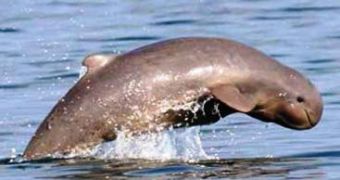A report made public by the World Wildlife Fund (WWF) explains how, for the time being, Laos has only six river dolphins left, and that these animals are to be found in a deep pool in the Mekong River, precisely on the border between said country and Cambodia.
The latter has already taken appropriate measures towards safeguarding these animals, meaning that it banned fishermen from setting gill nets in place on its side of the border.
However, Laos still allows local fishermen to catch fish with the help of gill nets, in spite of the fact that such practices pose significant threats to these six dolphins.
The WWF reports that as many as 30 river dolphins died in this part of the world since 1991 up until nowadays, primarily because they got caught up in fishing nets and ended up drowning.
Commenting on this situation, Gerry Ryan from WWF-Cambodia made a case of how, “Six river dolphins are swimming the gauntlet every day as they risk entanglement and death in the many floating walls of nets.”
Therefore, “Laos must immediately ban gillnets from the entire trans-boundary pool area on their side of the border, throughout the whole year, or face losing the country’s last river dolphins."
"The loss of the river dolphins would not only greatly diminish Laos’ biodiversity, it would suggest a potentially devastating decline in the health of the entire river ecosystem, and likely declines in other species too.”
Interestingly enough, the presence of freshwater dolphins in the Mekong river has led to ever more tourists coming to these regions for the purpose of wildlife watching.
Therefore, one would expect that both locals and the country's high officials would be more than willing to help save these dolphins, seeing how they help generate significant amounts of income from tourism.
As Gerry Ryan puts it, “It is clear that saving the dolphins also means smart development.”

 14 DAY TRIAL //
14 DAY TRIAL //